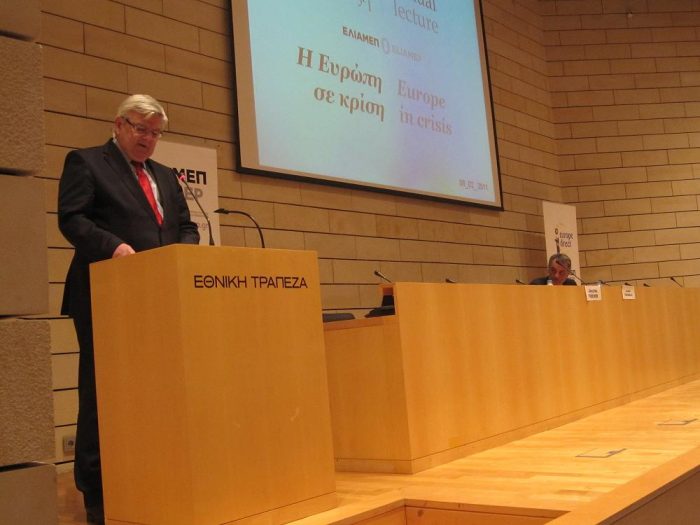Click here to watch the event
What is the nature of the crisis and how does the crisis affect our future? Joschka Fischer, former Foreign Minister and Vice-Chancellor of Germany (1998-2005) delivered the Annual Lecture of ELIAMEP entitled “Europe in Crisis” in which he attempted to give convincing answers to these questions. The lecture took place on Tuesday 8 February 2011, at 19.00, at 82-84, Aiolou str., where the National Bank’s Amphitheatre “Theodore Karatzas” is located, in front of a lively audience interested to hear the thoughts of an important political personality.
Joschka Fischer clearly affirmed that more than ever before, there is an urgent need to maintain the substantial achievements that Europe has offered to its people: peace, democracy, rule of law and economic development. This is the result of decades of European integration. Crisis should be seen as an “interesting” historical moment, an opportunity to change things.
The fall of the Berlin wall and the Balkan interethnic wars in the 1990s were defining moments in European history. Nowadays, Europe is confronted once again with “interesting times” as a result of the 2008 collapse of the global financial system and more recently the mounting sovereign debt crisis within the continent. Additionally, at a global level and in terms of power politics, while the Euro-Atlantic world is losing some of its importance, the global center of gravity is shifting towards the East and Asia. In this emerging global environment, what will happen to the Europeans? For Joschka Fischer, there is only one possible answer to this crucial question: either the Europeans will take care of themselves or nobody else will.
In the case of sovereign debt crisis, the incremental method by which the EU was built didn’t work
Fischer observed that the EU and the monetary union performed very well during the first part of the crisis, the private debt crisis. But with the sovereign debt crisis, the structural deficits and weaknesses of the construction of the currency Union became highly visible. It was the first time the incremental policy process didn’t prevail. According to the speaker, the survival of the monetary union is not simply a matter of preserving a tool of economic policy. The creation of the monetary union has been based on pragmatic reasons – increase of the internal trade and development of the common market-, but it was also a way to strengthen the European position in the global environment and, therefore, operating as a driving force to move forward into a more integrated Europe.
In favour of applying the enhanced cooperation in the field of fiscal policy
According to Joschka Fischer, it is better late than never that Merkel’s proposal towards a more integrated economic Union did finally emerge. This is a very important step forward and it should be taken seriously. He would agree that this should be done in the framework of the Treaty, but the current political conditions do not look favourable for reform based on a unanimous decision. If Europeans agree that the substance is more important than the method, they shouldn’t hesitate to use the available intergovernmental tools in order to move towards a real fiscal Union. Actually, the success story of the Schengen agreement proves that intergovernmental cooperation in a specific policy field doesn’t exclude its institutionalisation or even its communautarisation later on.
Fischer admitted that there is a disagreement on this point with the German Chancellor. Nevertheless, he insisted on the fact that enhanced cooperation under Lisbon Treaty rules is an instrument that gives the possibility to an avant-garde of Member States to move ahead without leading to a split regime.
A new kind of realism?
Having been ‘accused’ of being an idealist, Fischer replied that when he goes to China, he feels like being a realist believing in Europe.
Closer coordinated economic governance is the only realistic alternative method to:
- regain economic strength.
Closer coordination of budgetary policies leads to better coordination of economic and social national systems, thus creating progressively a Europe of solidarity and economic success.
- To preserve European security.
Europe has a challenging neighbourhood. It has to live with it and cope with security threats. The only way to preserve European security is to vest European economic possibilities/experiences in neighbourhood strategic partnerships.
- Preserve our credibility as a reliable NATO partner.
The new narrative: Our common future is Europe
The current political context seems difficult to manage for politicians in office as well as for national public opinions. There are several cases of bad language, behaviour and misunderstandings. Germans undervalue the importance of the common internal market. The country’s dependence on emerging markets is a complicated factor. On the other hand, Greeks should answer to the question “what kind of Greece do we wish to have in 15-20 years?” European states need the strength of the common market, which should not be limited to the north of European Union. The real challenge is to convincingly explain to all Europeans that if the Euro fails, the whole concept will fail leaving some sorts of free-market ideas to dominate the empty space.
Joschka Fischer remarked that, undoubtedly, Europe needs a new narrative. Europeans seem to have forgotten that they live in a continent of deep interdependence, which means that they are linked together by a common destiny. A new narrative will be created only through lively debates about Europe’s economic future. Different and fervent debates will take place in every country, but this democratic process for the creation of a narrative is absolutely essential. Europeans can change the fundamentals not only about how to organise their societies and economies, while preserving cultural diversity, but also about how to reshape their states together by promoting structural reforms. This is not a technocratic but a major political debate.




